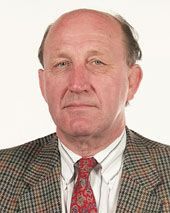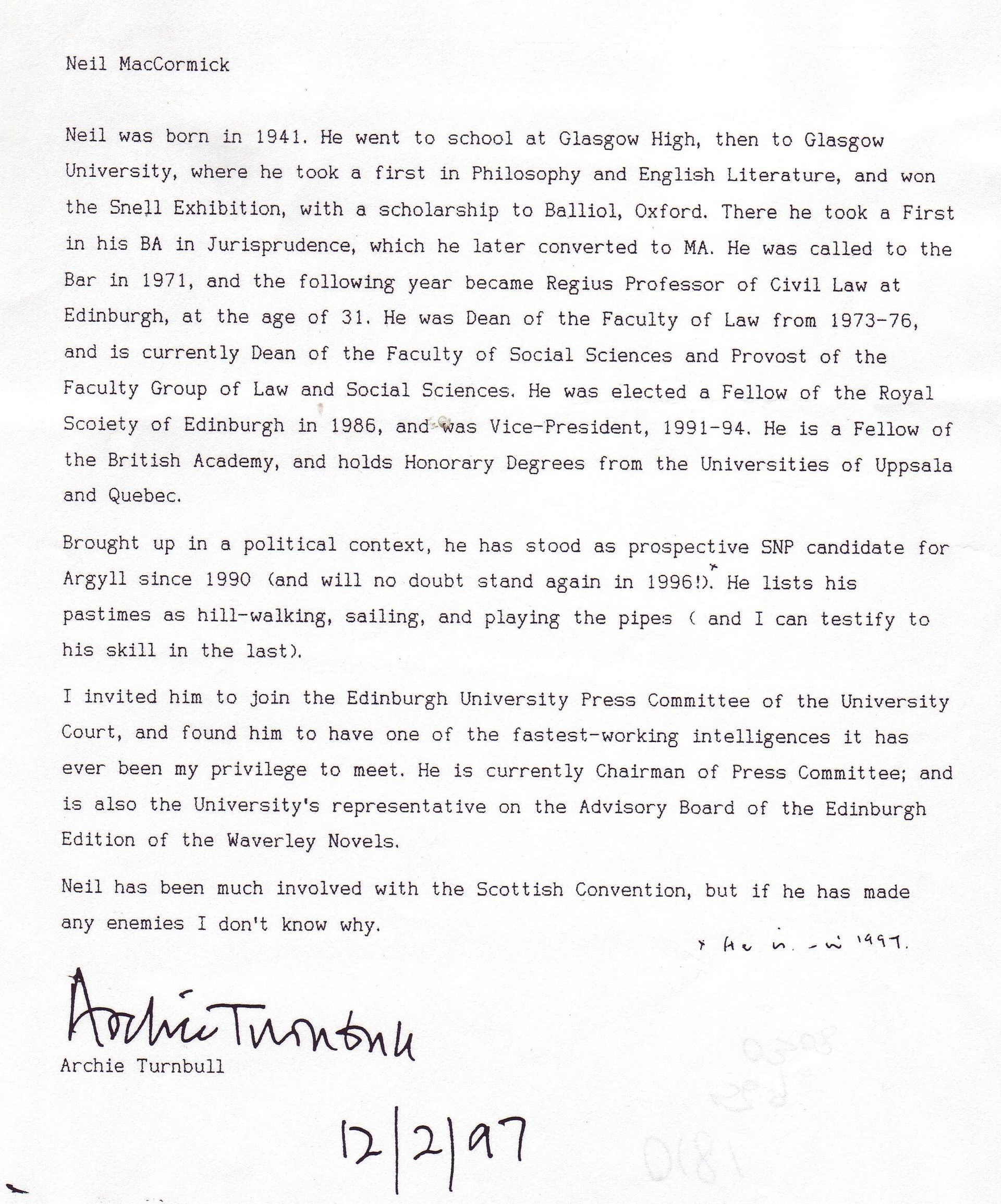1996
Our President in 1996/7 was:
Professor Neil MacCormick
He proposed the Toast to Sir Walter at our 88th Annual Dinner on Friday 1st March 1997 in The Balmoral Hotel, Edinburgh
Download the [transcript] or read the [bulletin]
Summary of the Speech:
Professor Neil MacCormick’s toast is a rich, scholarly, and often humorous meditation on Scott’s legacy.
Summary of Key Themes and Structure
1. Introduction: Tone and Humour
- Opens with self-deprecating wit about speech length expectations.
- Celebrates the honour of speaking near Scott’s statue and among luminaries like Archie Turnbull and David Daiches.
2. Edinburgh Edition of the Waverley Novels
- Commends the scholarly choice to base the edition on Scott’s first editions rather than later revisions, capturing their “racy” energy.
- Praises the editorial team (Turnbull, Daiches, Hewitt) and describes his own role as a “midwife” on the Scott Board.
3. Cultural Memory and Misunderstanding
- Notes worrying cultural amnesia among the young: e.g., confusion between Waverley (the novel) and Waverley Station.
- Mocks this gently with anecdotes and humorous imagined station names (Bleak House, À la recherche du temps perdu).
4. Ubiquity of Scott’s Legacy
- References ships, hotels, and pubs named after Scott’s works, often better known than the works themselves.
- Suggests this shows Scott's deep influence on collective Scottish identity—deeper even than Burns, at times.
5. Reconciliation as a Core Scott Theme
- Scott reconciles:
- Highland and Lowland identities (Waverley, Rob Roy)
- Jacobite and Hanoverian loyalties (Redgauntlet)
- Religious conflicts (Old Mortality)
- Saxon and Norman divisions (Ivanhoe)
6. Empathy for the Outsider
- Scott shows deep sympathy for marginalised figures:
- Rebecca (Ivanhoe)
- Meg Merrilies (Guy Mannering)—quoted in full to illustrate her powerful curse on the Laird of Ellangowan.
- Raises modern parallels (e.g. Bosnia, Burundi) to ethnic cleansing and displacement.
7. Enlightenment Foundations
- Frames Scott not just as a Romantic, but as a man of the Enlightenment:
- Echoes of Hume, Adam Smith, and especially Adam Ferguson.
- Interest in the “four-stage theory” of societal progress (hunter, pastoral, agrarian, commercial).
- Regret for lost communal virtue in modern, impersonal market societies.
8. Romanticism within Enlightenment Rationalism
- Sees Scott as a bridge figure: romantic in style but Enlightenment in worldview.
- Points out the contrast between Scott’s nuanced treatment of trial-by-combat in Ivanhoe and its trivialisation in modern TV adaptations.
9. Personal Reflections
- Shares memories of learning bagpipes from elderly Gaelic relatives, using this to reflect on cultural memory and vanishing worlds.
- Invokes Sunset Song and the World Wars as examples of irreversible change.
10. Political Resonance
- Concludes with a non-partisan but emotionally resonant reflection on modern Scottish identity.
- Praises Scott for helping create a civic Scottish identity that still inspires contemporary political and cultural engagement.
Interesting and Notable Points
- “Caledonian antisyzygy”: MacCormick playfully references this literary term for holding contradictory impulses in balance—a fitting frame for Scott as Enlightenment thinker and Romantic novelist.
- Ivanhoe and Trial by Combat: MacCormick’s reading of the climactic combat as a metaphor for moral strength over brute force is a subtle critique of modern misunderstandings of Scott’s moral imagination.
- Meg Merrilies’ Curse: Quoting it at length links Scott’s fiction to real-world injustices—clearances and ethnic violence—highlighting Scott’s enduring ethical relevance.
- Scott as a Figure of National Reconciliation: Perhaps the most sustained theme, making this speech particularly appropriate for a period (1997) of renewed debate about Scottish self-governance.
- Scott’s Creative Imagination as Nation-Building: MacCormick suggests that Scott offered Scots not only a literary heritage but a unifying narrative at a time of profound social division.
Download the [transcript] or read the [bulletin]

Subsidiary Toasts Summary:
1. Chairman’s Welcome and Introduction (Sheriff Gordon Shiach)
- Extended a warm welcome to guests and encouraged them to consider joining the Club.
- Introduced the top table, featuring notable figures such as:
- Mrs Tom Johnston, Sir Alistair Grant, Councillor Margaret McGregor, Dr Iain Brown, Mrs Patricia Maxwell Scott, and others.
- Infused with gentle humour and detailed anecdotes, including honours like Tom Johnston’s Swedish Order of the Polar Star.
2. Toast to Her Majesty The Queen
- A brief and formal moment; attendees were asked to rise and toast the Queen.
3. Toast to the City of Edinburgh
By the Chairman
- Celebrated the deep connection between Edinburgh and the Club.
- Introduced Councillor Margaret McGregor (Depute Convenor) to reply.
Reply by Councillor Margaret McGregor
- Spoke on Scott’s dual identity as a son of both Edinburgh and the Borders.
- Reflected on Scott’s presence during pivotal historical events (American/French Revolutions, Industrial Revolution).
- Noted Scott’s deep ties to urban development—he witnessed the creation of the New Town, the Mound, Charlotte Square, and Register House.
- Praised modern Edinburgh as experiencing a cultural and architectural renaissance not seen since Scott’s day.
- Celebrated the restoration of the Scott Monument, reaffirming the city's commitment to preserving his legacy.
4. Toast to the National Library of Scotland
By John Wightman
- Wightman drew upon three conceptions of a library in Scott’s world:
- Personal library – e.g., Jonathan Oldbuck’s “den” in The Antiquary.
- Working library – necessary for Scott’s referencing and literary productivity.
- National institution – traced the evolution of the Advocates’ Library into the modern National Library of Scotland (NLS) in 1925.
- Emphasised the importance of libraries to national identity and culture.
- Warned against underfunding and argued passionately for continued support.
Reply by Dr Iain Gordon Brown
- Delivered a rich historical commentary on the Advocates’ Library and its transformation into the NLS.
- Shared anecdotes of Scott’s own involvement, including an amusing story from 1796 when Scott, as a young Curator, failed to organise the coin collection.
- Detailed the acquisitions of Scott manuscripts (e.g. Waverley, Redgauntlet, Peveril of the Peak).
- Spoke with concern about budget cuts and stressed the need for legal deposit protections and public funding.
- Highlighted the NLS’s role as custodian of the nation’s memory and reaffirmed its deep link to Scott’s legacy.
5. Toast to the President
By Sir Alistair Grant
- A witty address that cleverly compared his speech to the abrupt endings of many of Scott’s novels.
- Noted that Scott wrote 458 pages of introductions, but only 51 pages of conclusions across his works.
- Praised Professor Neil MacCormick as:
- A scholar, patriot, wit, piper, and orator.
- A worthy embodiment of the Club's ideals.
- Ended with humour, citing Scott’s own fabricated quotation: “Superfluous lags the veteran upon the stage.”
6. Final Remarks
By the Chairman
- Praised the staff at the Balmoral Hotel for superb service and an "orchestral" dining experience.
- Recognised key contributors to the evening, including:
- Fraser Elgin, outgoing Secretary.
- Rev Duncan McGregor, incoming Secretary.
- Speakers and organisers.
Closing Word by Sheriff Bill Christie
- Delivered a brief thank-you to the Chairman for his excellent presiding.
- Gave a warm tribute to Fraser Elgin for his years of dedicated service, suggesting humourously that he deserved an honour like the “Order of the Morning Star”.
Final Quip
- A joking "vote of thanks" was offered to Prime Minister John Major—since had he called an early election, Professor MacCormick might not have been able to attend.
Points of Interest and Distinction
- High degree of historical literacy from all speakers, especially regarding Scott’s role in shaping national culture, law, and identity.
- Remarkable continuity between Scott’s world and late 20th-century Edinburgh, seen in urban development, legal scholarship, and literary influence.
- The evening balanced formality with charm and self-deprecating humour, typical of the Club’s ethos.
- John Wightman and Iain Brown’s exchange was a highlight—insightful, respectful, and anchored in deep institutional knowledge.
- Sir Alistair Grant’s textual analysis of Scott’s novel endings was a unique and humorous literary footnote.
Download the [Subsidiary Toasts] to read in full.
Sir Donald Neil MacCormick QC FBA FRSE was a Scottish legal philosopher and politician. He was Regius Professor of Public Law and the Law of Nature and Nations at the University of Edinburgh from 1972 until 2008. He was a Member of the European Parliament 1999–2004, member of the Convention on the Future of Europe, and officer of the Scottish National Party.
Text source: Wikipedia
Here is account of his life by Archie Turnbull
Neil was born in 1941. He went to school at Glasgow High, then to Glasgow University, where he took a first in Philosophy and English Literature, and won the Snell Exhibition, with a scholarship to Balliol, Oxford. There he took a First in his BA in Jurisprudence, which he later converted to MA. He was called to the Bar in 1971, and the following year became Regius Professor of Civil Law at Edinburgh, at the age of 31. He was Dean of the Faculty of Law from 1973-76, and is currently Dean of the Faculty of Social Sciences and Provost of the Faculty Group of Law and Social Sciences, He was elected a Fellow of the Royal Society of Edinburgh in 1986, and was Vice-President, 1991-94. He is a Fellow of the British Academy, and holds Honorary Degrees from the Universities of Uppsala and Quebec.
Brought up in a political context, he has stood as prospective SNP candidate for Argyll since 1990 (and will no doubt stand again in 1996!). He lists his pastimes as hill-walking, sailing, and playing the pipes (and I can testify to his skill in the last).
I invited him to join the Edinburgh University Press Committee of the University Court, and found him to have one of the fastest-working intelligences it has ever been my privilege to meet. He is currently Chairman of Press Committee; and is also the University's representative on the Advisory Board of the Edinburgh Edition of the Waverley Novels.
Neil has been much involved with the Scottish Convention, but if he has made any enemies I don't know why.
Archie Turnbull (12/02/97)



